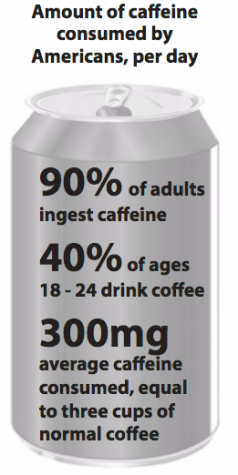Student caffeine use delivers mixed results

Source: The University of New Hampshire
There’s no escaping caffeinated beverages like soda and coffee.
We are bombarded with advertisements for caffeine products in commercials, radio, billboards and in every college campus across America, including Cosumnes River College with its vending machines, the cafeteria and the Hawks Nest.
“With caffeine, we can see it remaining in the body,” said nutrition Professor Timaree Hagenburger. “People think it peaks within 30 to 45 minutes, but research studies have shown that it is still in their bodies at least 12 hours later depending on the person.”
Caffeine can have both positive and negative effects on the human body. According to the National Coffee Association, three to five cups of coffee per day can lead to positive health results, like a reduced risk of Type 2 diabetes and prevention of liver disease.
Stephanie Baker, an 18-year-old criminal justice major, said she consumes a large amount of caffeine daily.
“I drink two coffees from Starbucks each day, then a lot of soda,” Baker said.
Baker added that she consumes that much because she gets up early, and it helps wake her up.
The biggest issue that Hagenburger has observed with college students is a lack of sleep due to studying late at night.
“If you prevent yourself from getting that deep sleep, then there is a very difficult time for your brain to put all the files in order to do during the day,” said Hagenburger.
Hagenburger said she offered her classes what she called a 30-day habit journey, where students take a habit and give it up for a month. A lot of students pick soda, she said.
“They feel amazing when they quit it afterwards, because it’s hard, because it’s everywhere.”
Walker Brown, an 18-year-old kinesiology major, said he quit consuming a lot of caffeine throughout the day.
“I would get a sugar rush and feel immediately tired afterwards,” Brown said.
He used moderation with caffeine, going from three cups of coffee per day to one or two cups of coffee per week.
Brown said that he feels much better, gets seven to 10 hours of sleep on average and feels more energized when he wakes up.
Caffeine use can lead to high blood pressure, and daily soft drink consumption may lower bone mineral density in women, according to webmd.com.
Baker explained that she only consumes caffeinated beverages when she is not at home because they are not available in her household – but would drink them if they were.
There are some alternatives to drinks that have a high level of caffeine. For example, Hagenburger suggested that green tea, which has a low level of caffeine per mg, or hibiscus tea, which has none.
Instead of trying to pull an all-nighter, Hagenburger suggested that people go to bed and then wake up earlier because their brain would better retain information, rather than staying up late and waking up feeling groggy.
“There is no recommended amount of caffeine a person should do daily because you can thrive without it,” Hagenburger said.
